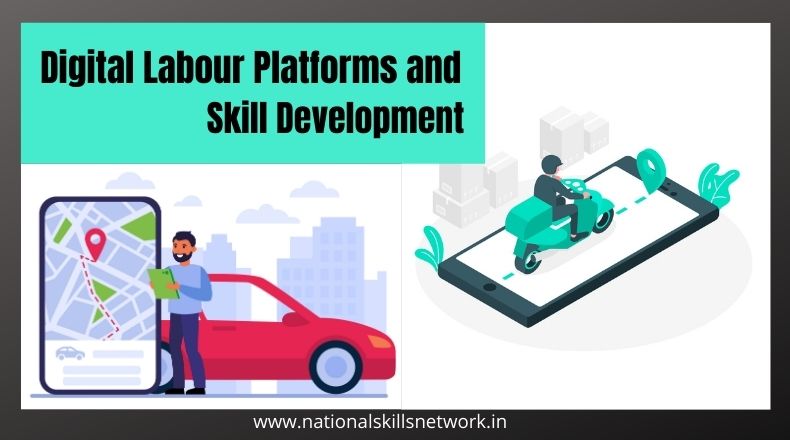This write-up is intended to create awareness among various stakeholders in skill development on some important reports from the International Labour Organisation on topics of digital labour platforms and the future of work.
From getting things delivered at our doorstep, to be able to choose from plenty of options to work from home, the world has changed incredibly post-Covid-19. Now, trying a side hustle and getting to work for additional income, has got accelerated thanks to the widespread adoption of digital technologies. The world of work is in for a radical transformation. Let’s see how digital labour platforms have become most indispensable.
Digital Labour Platforms
Digital labour platforms help people find and choose their work. The platforms like Uber, Swiggy, Ola have become a major part of our contemporary lives. From allowing us to access a number of services online to providing a plethora of opportunities to workers, digital labour platforms have made online work the future of work.
But, are digital labour platforms giving a fair opportunity and decent work to everyone? How are they impacting the future of work? These are some of the important questions that we need to explore in the larger context of how the gig economy/platform economy is transforming jobs and careers. Let us begin by understanding what are digital labour platforms.
The information provided in this presentation is based on our learnings from the reports from the ILO on “Digital labour platforms and the future of work – Towards decent work in the online world” and “World Employment and social outlook – The role of digital labour platforms in transforming the world of work”.
Digital labour platforms are digital platforms that provide workers the opportunity to work from any place, at any time, and take up whatever job suits them. They include both web-based platforms and location-based platforms.

Web-based platforms
In web-based platforms, the work is outsourced through an open call to a geographically dispersed crowd. For example, Freelancer.com, Upwork, and similar platforms provide access to freelance and contractual work.
Location-based platforms
In location-based applications, the work is allocated to individuals in a specific geographical area. For example, Swiggy and Uber, which we can access with the help of apps.
Globally, we have also seen a rise in gigs and gig workers or platform workers. The advancements in information and communication technology and deeper penetration of the internet across the world, have contributed majorly to the growth of online work and digital labour platforms.
Digital labour platform and importance of skill development
Nevertheless, do all the workers face fair competition? Before we go into that, let us all understand and accept that all the industries are undergoing changes. The demands of the customers and the marketplace are increasing and diversifying. Therefore, to stay relevant and to stay in the competition, the solution lies in skilling, reskilling and upskilling.
- Continuous learning is the only way to be competent for the new on-demand job roles. Upskilling in the latest technologies like blockchain, robotics, artificial intelligence, etc., can help one thrive on the changing demands.
- Though most of the workers on digital labour platforms are motivated and happy to be able to choose their tasks, fix their own schedule, and work from home (in some instances), but a majority of them also face many challenges.
- Right from the issue of pay rates, where some of them are paid below minimum wage rates and they often lack the power of bargaining; work intensity, work availability, unreasonable rejections, non-payments, long-working hours, lack of social security are a major point of concern.
- The platform workers also face the issue of skill mismatch and career development.
- The skills that a gig worker has and the work he/she performs do not match in most cases. The opportunity to reskill, upskill, and continuously learn are also limited to such employees.
- Despite the issues and challenges, the fact that digital labour platforms have transformed the world of work across businesses cannot be denied.
Related article: How the gig economy is unfolding a secure future for the informal workforce – Read more: https://nationalskillsnetwork.in/how-the-gig-economy-is-unfolding-a-secure-future-for-the-informal-workforce/
As many more economies are widely accepting the digital labour platforms and putting in place various regulatory frameworks, there need to be consistent efforts to protect the platform workers against exploitation. All the workers must be given the power of bargaining, social protection, and ensure fair competition and access to decent to work for all.













